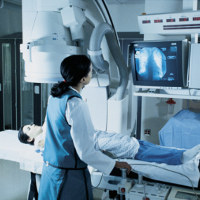
Jakarta, Description
Radiop or radiopaque agents are medications used to help diagnose certain medical problems. These medicines contain iodine, which can block X-rays.
Its use depends on how the radiopaque agent will be given, to localize or collected in certain areas of the body. High level of iodine allows the X-rays to create a 'picture' of the area.
Regional body that has been localized to the radiopaque agent will appear white on X-ray film so that it will create the contrast needed to distinguish between one organ and other tissues. It also helps doctors see the special conditions in an organ or body part.
Local radiopaque agents are used in the diagnosis include:
1. For urinary tract disease: Diatrizoates, iohexol, Iothalamate
2. For diseases of the uterus and fallopian tubes: Diatrizoate and Iodipamide, Diatrizoates, iohexol, Ioxaglate.
Catheter or syringe can be used to insert a radiopaque fluid into the bladder or ureters to help diagnose kidney and urinary tract diseases.
Can also be placed into the uterus and fallopian tubes to help diagnose diseases of the organs. After the tests performed, the patient throw radiopaque fluid through urination.
Radiopaque agents are classified according to size or concentration is called osmolality. Agent with low osmolality newer and more expensive than high osmolalitasnya. For most patients, an agent with high osmolality is a good and safe choice.
There are some patients who are at risk of his body suffered a severe reaction to radiopaque agents, namely patients with a history of asthma or allergies. For these patients, low osmolality radiopaque agent may be an option.
Dose
Different doses of radiopaque agents for different patients and depends on the type of test. Its strength is determined by how much iodine content. Different tests require different strengths and the number of solutions depending on the patient's age, the contrast is needed, and x-ray equipment used.
To test the kidneys and urinary tract area, the amount of solution to be used depending on the size of the bladder.
Radiopaque agent should be used only under the supervision of a physician or radiologist radiology. For convenience and for best results, patients may first be asked to urinate just before the procedure.
Side effects
1. Abdominal pain and discomfort
2. Shiver
3. Fever
4. Nausea and vomiting
Tidak ada komentar:
Posting Komentar